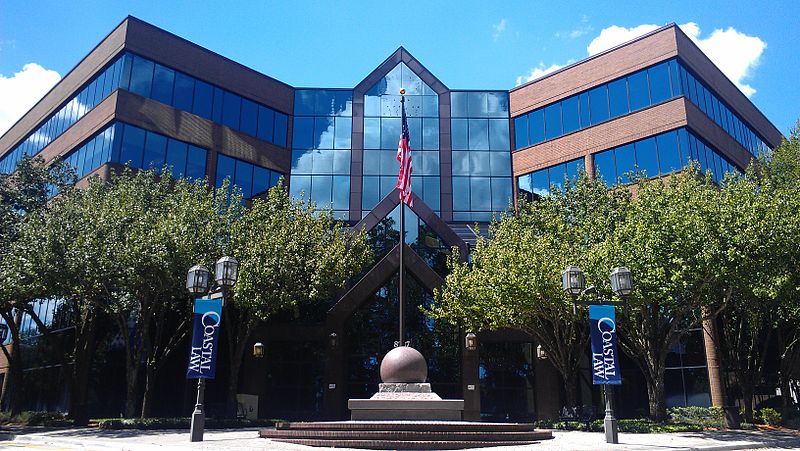As Florida Coastal tries to get student loan funds reinstated, ABA seeks teach-out plan

The Florida Coastal School of Law. Photo from Wikimedia Commons.
The U.S. Department of Education has terminated the Florida Coastal School of Law’s access to federal student financial aid, and the for-profit school has been directed to file a teach-out plan with the ABA’s Section of Legal Education and Admissions to the Bar.
The school learned Thursday that its Title IV eligibility was cut off and claims that it is related to a new DOE policy that requires a signature from a school investor, News4Jax reports.
Peter Goplerud, the law school’s president and dean, told the ABA Journal that the school is resubmitting the DOE application Tuesday, and that students have their loan money for the current term. Florida Coastal’s parent company is InfiLaw, an entity of the private equity firm Sterling Capital Partners.
“We are working diligently with the Department of Education to secure reinstatement of our participation in the Title IV program,” Goplerud wrote in an email to the Journal.
Rule 29 of the ABA Standards and Rules of Procedure for Approval of Law Schools addresses teach-out plans, which are required if the DOE initiates an emergency action against a law school.
The executive committee of the section’s council expects to review Florida Coastal’s teach-out plan in late April, wrote Bill Adams, managing director of ABA accreditation and legal education, in an April 5 statement.
Until the process is completed, Florida Coastal remains an ABA-accredited school.
“The action by DOE is a separate action that could ultimately have a bearing on the accreditation process. The council of the Section of Legal Education and Admissions to the Bar, which is recognized by DOE as the national accreditor of law schools, will continue to work with the department and Florida Coastal School of Law to ensure a fair process and a fair outcome for all stakeholders,” Adams wrote in a separate emailed statement to the Journal.
This is the second time in two years that the law school had complications with federal student loan money. In 2019, after it did not meet fiscal responsibility standards required by the DOE, the agency required Florida Coastal to submit a letter of credit before student loan money was released.
The signature issue may be related to DOE rules published in 2019, which require schools to show proof that financial commitments can be covered, according to Riaz Tejani, a professor at the University of Redlands School of Business. He wrote a book titled Law Mart: Justice, Access, and For-Profit Law Schools.
Tejani adds that Florida Coastal’s goal of eventually becoming a nonprofit school might have caused the signature issue. The law school filed a substantive change request with the ABA to become a nonprofit law school, but it was denied in November 2019.
Gopplerud told the Journal in late March that the school still thinks becoming a nonprofit would be its best choice, but there was nothing definite for now.
“Because that conversion has so far stalled, my impression is that the school is in a Catch-22 of needing to show ownership solvency but lacking a readily coherent ‘owner’ to step forward without compromising their nonprofit conversion bid,” Tejani wrote in an email to the Journal.



